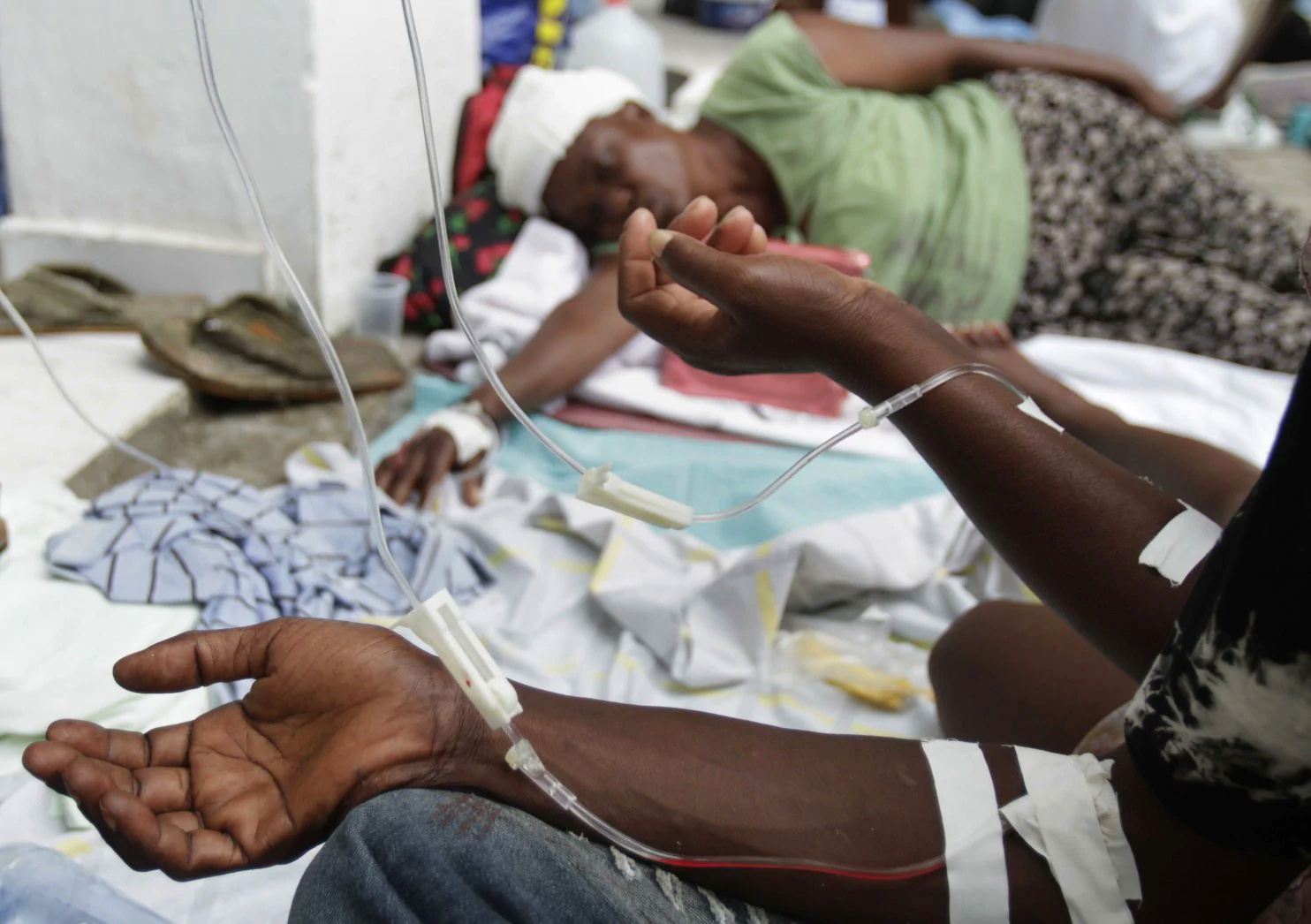
Magnitude of earthquake that struck Haiti on January 12, 2010: 7.0
Years since an earthquake of that magnitude struck Haiti: 168
Number of aftershocks, over 4.5 magnitude, in the week after the initial tremor: 51
Total number of government ministry buildings, before the earthquake: 29
Number of government ministry buildings that stood after the earthquake: 1
Number of United Nations troops and police stationed in Haiti, at the time of the earthquake: 9,057
Date on which the United Nations voted to increase the number of troops by 4,000: January 19, 2010
Number of U.S. military personnel sent to Haiti, or stationed on ships off Haiti’s shores, by the end of January 2010: 22,200
Number of U.S. citizens evacuated from Haiti in 2010: over 16,000
Cost of the U.S. military’s response to the earthquake: at least $461,000,000
Official death toll: 316,000
Estimated death toll, based on survey data: 46,190 to 84,961
Estimated value of damages and losses, in percent of Haiti’s 2009 GDP: 113

Amount pledged by donors for short- and long-term reconstruction at a March 2010 donor conference: $10.7 billion
Percent of $2.4 billion in donor provided humanitarian assistance that went to the Haitian government from 2010 to 2012: 0.9
Billions in humanitarian and reconstruction aid disbursed by donors from 2010 to 2012: $6.4
Percent of that which was disbursed directly to Haitian organizations, institutions or companies: less than 0.6
Percent of U.S. families that donated to earthquake relief efforts: 45
Estimated amount of private money raised, predominantly by NGOs: $3.06 billion
Number of homes destroyed by the earthquake: 105,000
Number of homes damaged: 208,000
Estimated number of individuals displaced by the earthquake: 1.5 million
Number of individuals evicted from camps for the internally displaced, between June 2010 and March 2011: 230,000
Estimated number of individuals living in damaged or destroyed houses in 2011: 1,036,174
IDP camp population in December 2019: 33,000
Population of Canaan, an area about 15 kilometers outside of the capital, at time of earthquake: 0
Population of Canaan now: at least 300,000
Amount of money raised by the American Red Cross for Haiti: $486,000,000
Number of new houses built by American Red Cross (as of June 2015): 6
Number of new houses USAID planned to build after the earthquake: 15,000
Original estimated cost of those 15,000 houses: $59 million
Number of houses USAID actually built: 900
Miles from Port-au-Prince where the original housing construction site was planned: 8
Miles from Port-au-Prince where 750 of the 900 houses were actually built: 130
Projected average cost of the new houses: $8,000
Final average cost of the 750 houses built in Northern Haiti: $77,125
Number of those 750 houses originally built to earthquake standards: 0
Amount spent by U.S. taxpayers to fix structural problems with the 750 houses: $21,237,888
Date by which the two main U.S. contractors involved in housing construction were suspended from receiving U.S. government contracts: March 25, 2015
Amount the two suspended contractors were fined: $0
Total USAID spending for Haiti since January 2010: $2,479,512,152
Percent of that amount that went to contractors inside the Beltway (Washington, DC; Maryland; and Virginia): 54.1
Percent of USAID spending that went directly to local Haitian companies or organizations: 2.6
Amount disbursed to Chemonics International and Development Alternatives Incorporated: $473,992,419
Amount spent in 2012, on lobbying against USAID reforms, by the Coalition of International Development Companies (which includes Chemonics and DAI): $250,000
Amount allocated by USAID and the Inter-American Development Bank (IDB) to support the Caracol Industrial Park, the international community’s flagship postquake project: $350 million
Date on which the industrial park was inaugurated: October 22, 2012
Number of jobs the State Department promised the new industrial park would create: 65,000
Total number of jobs at the industrial park, as of 2017: 10,214
Amount allocated by USAID to build a new port in support of the industrial park: $72 million
Date on which USAID abandoned its plans to support a new port in northern Haiti: May 2018
Minimum number of residents displaced by the construction of the Caracol Industrial Park: 400
Date on which those 400 residents reached an agreement with the IDB and Haitian government on corrective measures, including access to new land: December 8, 2018
Daily minimum wage, in Haitian gourdes, in 1990: 15
Daily minimum wage, in Haitian gourdes, in 2019 (adjusted for inflation, in 1990 gourdes): 9.6
Millions of dollars in textiles exported to the United States in 2009: $491
In 2019: $740
Year in which per capita GDP reached its pre-earthquake level: 2013
Average annual per capita GDP growth in the years since 2013: 0.1 percent
Exchange rate at time of earthquake (Haitian gourdes per U.S. dollar): 40.5
Exchange rate today: 92
Inflation rate in 2009: 3.43
Inflation rate in 2019: 17.58
Number of United Nations missions in Haiti since the earthquake: 3
Total number of years that the United Nations Stabilization Mission in Haiti (MINUSTAH) remained in country: 13
Number of Sri Lankan peacekeepers who abused children in a sex ring from 2004 to 2007: at least 134
Number of those peacekeepers removed from Haiti: 114
Number of those peacekeepers imprisoned: 0
Number of Haitians reporting children fathered by UN troops or other personnel: 265
Minimum number of allegations of sexual abuse and exploitation at the hands of UN troops or other personnel in Haiti, from 2004 to 2016: 150
Date the first Haitian contracted cholera: October 19, 2010

Number of days it took the United Nations to admit responsibility for introducing cholera to Haiti: 2,129
Official number of cases registered since: 819,000
Official number of deaths: 9,789
Factor by which epidemiologist Renaud Piarroux believes this underestimates the death toll: 8
Cost of the 13-year MINUSTAH mission: $7,207,843,300
Fraction of that which donors spent in responding to the cholera outbreak: 1/10
Amount raised by the UN’s multidonor cholera trust fund: $10,615,595
Haiti’s ranking in the UN Human Development Index in 2009: 149
In most recent update: 169
Number of Haitians undernourished (three-year average from 2008 to 2010): 5 million
Number of Haitians undernourished (three-year average from 2016 to 2018): 5.4 million
Number of people in Haiti in need of “urgent food assistance” now: 3.7 million
Dollar amount of food imported by Haiti in 2009: $483.9 million
In 2018: $909.9 million
In 2019: $729.1 million
Dollar amount of food exported by Haiti in 2009: $28 million
In 2019: $20.7 million
Percent increase in rice consumption, 2009 to 2019: 40.7
Percent increase in local rice production, 2009 to 2019: 13.8
The cost, in 2010, of purchasing the entire local rice crop to use as food aid: about $70 million
Metric tons of food aid sent by USAID to Haiti in 2010: 152,960
Total cost: $161,792,300
Date on which former U.S. president Bill Clinton apologized for undermining Haiti farmers for the benefit of rice producers in Arkansas: March 10, 2010
Local agricultural production, in metric tons, bought by the World Food Program for food assistance programs in Haiti, in 2018: over 700
Children who receive school meals from World Food Program in Haiti today: 275,000
Percent of those meals that contain local products: 15
Date on which Hurricane Matthew made landfall on Haiti’s Southern Peninsula: October 4, 2016
Number of years since a hurricane of similar magnitude struck Haiti: 62
Estimated percent of crops destroyed in the Grand’Anse region: 100
Estimated percent of livestock killed in the same department: 85–90
Estimated amount Haiti needed for reconstruction after the hurricane: $2.2 billion
Amount requested in a UN flash appeal for humanitarian funding: $139 million
Percent of flash appeal that was funded: 62.1 percent
Average UN humanitarian funding appeal for Haiti, 2011–2019: $200,961,058
Average percent funded: 44
Total foreign assistance disbursed in Haiti since the 2010 earthquake, as of 2018: $11,581,637,407.32
Total amount of budget support provided by international donors: $282,503,604
Number of Haitian presidents since 2010 earthquake: 4
Percent of the 11,181 tally sheets of electoral results that were never counted or never received after the November 28, 2010 election: 12.2
Date on which members of the international “Core Group” threatened then President René Préval with forced exile: November 28, 2010
Participation rate in that election: 22.8 percent
Date on which a draft OAS audit of the elections, which recommended changing the results, was leaked: January 10, 2011
Date on which then Secretary of State Hillary Clinton flew to Haiti to pressure the Preval government to change the results of the election: January 30, 2011
Date on which Michel Martelly, who had initially placed third therefore missing the runoff, was sworn in as president: May 14, 2011
Value of in-kind support that a USAID contractor provided to an organization linked to Martelly’s campaign to clean the streets of the capital before the inauguration: $98,928
Number of elections held in Martelly’s first four years in office: 0
Date on which the terms of the entire lower house and two-thirds of the Senate expired: January 12, 2015
Number of political parties that registered to participate in Haiti’s August 2015 legislative elections: 128
Number of candidates: 1,852
Number of seats up for grabs: 139
Percent of votes that were never counted due to irregularities, including fraud and violence: 25
Date on which Haiti’s first-round presidential election was held: October 25, 2015
Number of candidates participating in the 2015 presidential election: 54
Date on which the planned second-round presidential election was indefinitely called off due to widespread irregularities: January 22, 2016
Number of untraceable votes in the October 25, 2015 election, according to an independent verification commission: 628,000
Date on which a new parliament was sworn in despite the election being canceled at the presidential level: January 11, 2016
Participation in the 2016 rerun presidential and partial legislative election: 18 percent
Number of elected senators arrested and extradited to the U.S. to face drug trafficking charges before taking office: 1
Date on which Jovenel Moïse was inaugurated president: February 7, 2017
Number of votes received by Moïse: 590,927
Current Haitian population, estimate: 11 million
Average annual disbursement, through the Venezuela-led Petrocaribe program, 2011–2015: $270.8 million
Date on which former president Michel Martelly appointed the brother of his political party’s president to lead the agency that controls the Petrocaribe fund: February 3, 2015
Date on which Jovenel Moïse, Martelly’s chosen successor, registered as a presidential candidate: May 21, 2015

Date on which the government authorized $1 million in disbursements from its Petrocaribe account to Agritrans, a company owned by Jovenel Moïse: May 26, 2015
Minimum amount allocated to a project to build sports centers, run by former president Michel Martelly’s son: $27.7 million
Date on which Gilbert Mirambeau Jr., a Haitian filmmaker, Tweeted a photo of himself, blindfolded, holding a sign asking where the Petrocaribe money is: August 14, 2018
Percent of Haiti’s 10 departments that experienced massive demonstrations on October 17, 2018 asking where the Petrocaribe money is: 90
Minimum number of Haitians killed by armed gangs and corrupt police on November 13, 2018 in the La Saline neighborhood of Port-au-Prince: 70
Date of the second mass mobilization demanding accountability for Petrocaribe corruption: November 18, 2018
Date on which Haiti’s Superior Court of Auditors released its first report on Petrocaribe: January 31, 2019
Date on which the second report was released: May 31, 2019
Number of pages in the second report: 612
Number of government officials or private sector actors imprisoned due to Petrocaribe corruption: 0
Number of foreign mercenaries arrested outside the Haitian central bank in February 2019: 7
Days those mercenaries remained in jail in Haiti before U.S. officials intervened and facilitated their flight back to the U.S.: 3
Total prison population: 10,905
Fraction of prison population that is still awaiting a trial: 3/4
Number of inmates in Port-au-Prince’s “national penitentiary”: 3,626
Number the prison was built to hold: 778
Number of Haitians killed during demonstrations since July 2018: 187
Percent who died from a bullet wound to the head: 22.5
Minimum number of civilian massacres: 5
Estimated number of individuals killed in those massacres: 127
Number of police officers killed in 2019: 44
Months that Haiti has not had a prime minister ratified by parliament: 10
Date on which Haiti broke longstanding diplomatic precedent and voted against Venezuela at the Organization of American States (OAS): January 10, 2019
Date on which President Donald Trump invited Jovenel Moïse to Mar-a-Lago to thank him for his vote: March 22, 2019
Number of U.S. members of Congress who wrote to the State Department in March 2019 pushing for human rights and corruption accountability in Haiti: 106
Number of civil society and other organizations that signed a document in late 2019 calling for Moïses’s resignation and the formation of a transitional government: 107
Number of elections held under Jovenel Moïse: 0
Date on which the terms of the entire lower house and two-thirds of the Senate expired: January 13, 2020
Republished, with light edits, from the CEPR’s Haiti: Relief and Reconstruction Watch blog.









